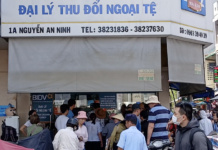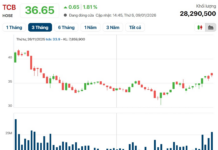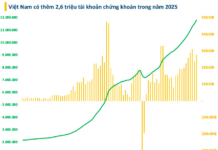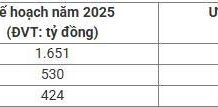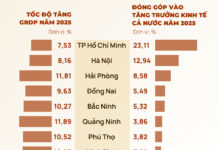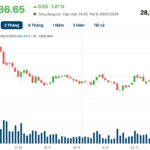The Ministry of Finance is seeking feedback on a draft proposal to restrict the overseas travel of individuals and business owners with tax debts exceeding 10 million VND after 120 days, and legal representatives of businesses with tax debts over 100 million VND. This measure aims to improve tax compliance and reduce tax evasion.
Concerns About the Proposal
The draft also outlines a procedure for tax authorities to notify debtors of the travel restriction by electronic means. If electronic notification is not possible, the tax agency will post the information on its website.
After 30 days of notification, if the individual or business has not settled their tax debt, the tax authority will issue a document to temporarily suspend their overseas travel, which will be sent to the immigration management authority for enforcement.
Financial experts have expressed concerns about the proposal, arguing that while the Ministry of Finance has provided specific tax debt amounts, they have not justified the calculation basis. They emphasize that the temporary travel ban is just one of the measures to improve tax compliance and that the focus should be on encouraging timely payment rather than the amount of debt.
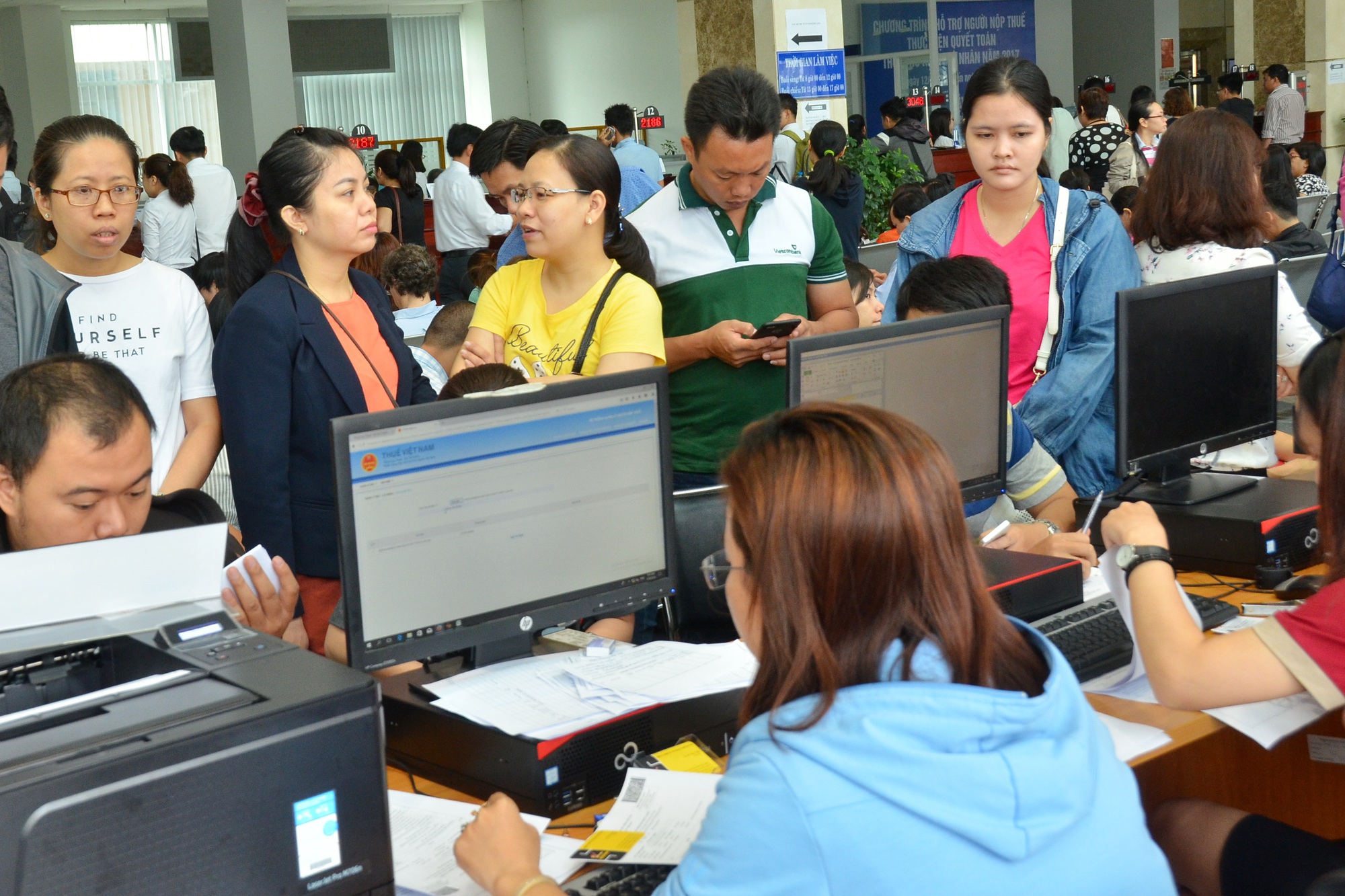
Businesses processing tax procedures at Ho Chi Minh City Tax Department. Photo: Tan Thanh
The Vietnam Chamber of Commerce and Industry (VCCI) has pointed out that the draft’s provision to restrict the overseas travel of individuals with tax debts of 10 million VND without an administrative decision on tax management is inappropriate. They argue that determining an individual’s tax debt relies solely on information stored by the tax authority, which may contain errors. Only through tax inspection and the issuance of administrative tax decisions can this information be thoroughly scrutinized and verified. Therefore, VCCI suggests that travel restrictions for individuals should only be applied after an administrative tax decision has been made to prevent any unfortunate misunderstandings.
Regarding the threshold for tax debt leading to a travel ban, many businesses have expressed that the proposed amounts are too low. They argue that individuals or legal representatives of businesses often travel abroad to meet with partners and conduct transactions, which contribute to increased revenue and, subsequently, enhanced tax contributions. Imposing a low threshold for tax debt could result in a widespread ban on overseas travel, negatively impacting business operations and causing long-term economic losses for the state budget. As a result, VCCI has recommended that the Ministry of Finance consider raising the tax debt threshold to 1 billion VND for businesses and 200 million VND for individuals.
Potential Risks for Businesses
Mr. Nguyen Van Duoc, General Director of Trust Tax Consulting and Accounting Company, shared his perspective as an expert. He believes that the proposed thresholds for tax debt and the duration of the debt are reasonable. Currently, the law allows tax authorities to enforce compulsory measures for cases with tax debts exceeding 90 days. Extending this period to 120 days provides taxpayers with additional time to fulfill their obligations to the state budget. “Regarding the amount of tax debt, the suggested levels of 10 million VND for individuals and 100 million VND for legal representatives of businesses are appropriate in the current context. If thousands of businesses and individuals were to default on their taxes at these levels, the state budget would face a significant risk of revenue loss,” said Mr. Duoc.
Moreover, Mr. Duoc suggested that the thresholds for tax debt leading to a travel ban should be adjusted as economic and social conditions evolve, including lowering the thresholds if tax debt increases. In cases of genuine hardship, tax authorities could consider granting extensions or allowing debtors to travel abroad to seek business opportunities that would enable them to repay their debts.
Citing the case of Mr. Luong Hoai Nam, General Director and legal representative of Bamboo Airways, who faced a travel ban in September 2024 due to tax debts, Mr. Duoc emphasized the risks associated with such situations. He explained that businesses may experience anxiety and disruptions to their operations during such incidents. Similar cases involving individuals like Mr. Nguyen Quach Cuong, Chairman of Thanh Nam Group, and the chairman of Hoang Quan Group, have also had significant impacts on the individuals and their respective companies, potentially leading to broken business plans and lost partnerships. “There may be instances where individuals and legal representatives of businesses are unaware of their tax debt and the consequent travel restrictions, which could come as a shock. To mitigate such situations, taxpayers should keep their contact information, including address, email, and phone number, up to date with the tax authority. Additionally, they can check their tax status on the Etax system and stay informed about exit and entry notifications on the website of the General Department of Taxation,” advised Mr. Nguyen Van Duoc.
Numerous Individuals Already Facing Travel Bans
In reality, the law does not currently specify a minimum tax debt amount for imposing a travel ban. Therefore, even if a taxpayer owes as little as 1 VND and exceeds the 90-day deadline, the tax authority has the right to request a temporary suspension of their overseas travel.
However, before enforcing this measure, the tax sector has implemented other compulsory measures, such as deducting money from the taxpayer’s account, requesting a freeze on their bank account, asking the customs sector to stop processing import and export goods procedures, and suspending the use of invoices. If these actions do not lead to debt recovery, the tax authority will then notify the taxpayer about the temporary travel ban and publish this information on the General Department of Taxation’s portal.
According to the Ho Chi Minh City Tax Advisory and Agency Association, the tax sector has been actively enforcing compulsory measures, including requesting temporary suspension of exit and entry for individuals and legal representatives of businesses with tax debts. From the beginning of 2024 until now, tax authorities have proposed travel bans for 65,000 people, a threefold increase compared to 2023, which saw 2,400 such cases.
The Oil Baron’s Company: Uncovering the Secrets of Ninh Binh’s Energy Empire
According to Tien Phong Newspaper’s sources, Trung Linh Phat Limited Company, a key petroleum trader in Ninh Binh province, tops the list of local tax debtors with an outstanding tax liability of over VND 195.8 billion. Notably, this company has just had its business license revoked by the Ministry of Industry and Trade.
The Art of Persuasion: Crafting Compelling Copy for the Modern Audience
“The Tax Department Director of Quang Nam Responds to Taxpayers’ Concerns.”
The Quang Nam Provincial Tax Department has provided detailed guidance and explanations to taxpayers regarding personal income tax regulations and the eTax Mobile app. They are committed to ensuring taxpayers have a clear understanding of their tax obligations and how to utilize the app effectively.
The Ultimatum for Temu: A Make-or-Break Moment
The General Department of Taxation representative stated that the new Temu platform is expected to generate taxable revenue in October and will declare its revenue in the fourth quarter of this year. The deadline for submission is January 31, 2025, provided it receives permission from the state management agency to operate. Meanwhile, the Ministry of Industry and Trade has issued an ultimatum, demanding that the platform complete the necessary procedures as per regulations.
Add a Channel to Notify of Delayed Exit for Unpaid Taxes
The tax delinquent, regardless of the amount owed, will be temporarily barred from exiting the country, according to the leader of the General Department of Taxation. They have established multiple channels to forewarn these individuals, ensuring they are aware that they cannot leave the country until their tax obligations are fulfilled.









